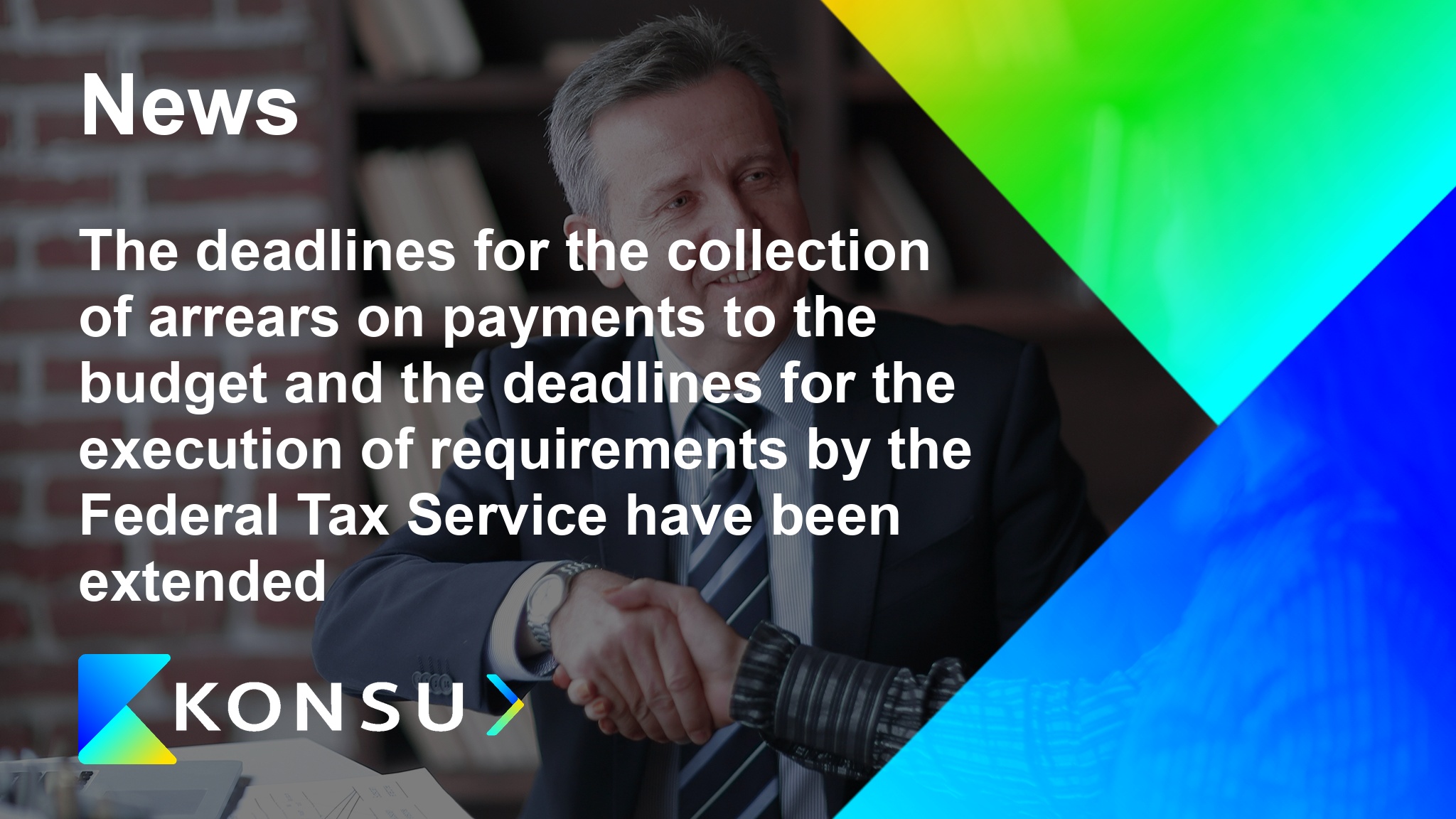The law on taxation of incomes of employees working remotely from abroad has been passed by the State Duma
Employees who work for Russian companies remotely under both labor contracts and civil-law contracts (such as civil-law agreements) will pay a personal income tax (PIT) at a rate of 13% (or 15% for high incomes), regardless of their tax residency.Read more
The Ministry of Finance has updated the tax haven blacklist
Read more
The deadlines for the collection of arrears on payments to the budget and the deadlines for the execution of requirements by the Federal Tax Service have been extended
According to Resolution No. 500 of the Government of the Russian Federation dated March 29, 2023, the maximum deadlines for sending demands for payment of arrears and making decisions on the collection of arrears have been extended by 6 months.
In addition, the Federal Tax Service of Russia has published information on its website stating that the deadlines for executing requirements sent to taxpayers in April will be extended to 1 month (instead of 8 days). Before issuing demands to personal account users and those who interact with the Federal Tax Service through telecommunications channels, references will be sent with a breakdown of the total amount of debt by types of taxes and payment deadlines. This will allow taxpayers to compare their data with information from the tax authority and pay the debt if it is confirmed. For example, in case of an error, a correct notice of advance payments can be submitted or an application for tracing the payment can be filed. Decisions on collection will only be made upon confirmation of the correctness of the taxpayer's negative balance. Additionally, from January 1 to June 30, 2023, penalties will not be charged in cases where the taxpayer made mistakes when forming the notification of calculated taxes or did not send it at all.
Recognition and taxation of controlled foreign companies
This article is about the status of controlled foreign company, methods of CFC recognition, notices and calculation of CFC profit and how it is accounted for in Russian tax residents’ income.
Read more
Overview of legislation changes - March 2023
Overview of the most important legislation changes - March 2023
Read more
Obligation for Russian tax residents to declare and pay personal income tax
The deadline for submitting personal income tax returns for 2022 on 3-NDFL form is May 2, 2023. Our tax consultants let you know to whom and when personal income tax returns should be submitted and describe the possible penalties for unintentional and deliberate failure to declare income and pay personal income tax.
Read more
The EU has included Russia in the "blacklist" of jurisdictions, suspension of double taxation avoidance agreements is possible
On February 14, 2023, the Council of the European Union ("EU Council") released a press release stating that Russia has been included in the "blacklist" of non-cooperative jurisdictions for tax purposes. According to EU authorities, Russia is not striving to resolve issues related to a special regime for international companies in special administrative regions to meet the criteria of effective tax management of the European Union.Read more
4 harmful and dangerous misconceptions about storing accounting documents
From letters from colleagues and explanations from government agencies, we have identified harmful and dangerous misconceptions about document storage. In our article, we describe what accountants most often confuse.
Misconception #1. Electronic primary documents must be stored in printed form.
The law does not require printing electronic primary documents and keeping them in paper form. Tax authorities have the right to demand documents during inspections, and as a rule, certified copies (Art. 93, para. 2 of the Tax Code) must be provided. But if the document is made in electronic form, send it through a personal account or via electronic reporting system.
There are cases when it is impossible to present documents in the form in which they are made. The company has the right to issue electronic documents in any format (letter from the Federal Tax Service dated December 9, 2022, No. ZG-3-26/13861). But tax authorities can only accept documents in the form of xml files and scanned copies (tif; jpg; pdf; png).
Documents not in the format of the Federal Tax Service can be sent to the inspection in two ways. The first is to print and send on paper with a note that the document is certified by an electronic signature (letter from the Federal Tax Service dated December 11, 2017, No. ED-4-15/25048). The second - print, scan, and certify the scan with a reinforced electronic signature (letter No. ZG-3-26/13861).
Misconception #2: Paper documents can be scanned and stored in electronic form
Keep documents in the form in which they were created (para. 24 of FSBU 27/2021). Converting paper documents to electronic form is not allowed. This is confirmed by officials (letters from the Ministry of Finance dated December 28, 2022, No. 07-01-10/128798, and December 5, 2022, No. 03-03-10/118589).
Tax inspectors during an audit have the right to familiarize themselves with the originals of the documents (para. 7, clause 2, article 93 of the Tax Code). Scanned documents do not replace paper originals, even if copies are certified with an enhanced electronic signature. If a company only has scans, inspectors will disallow expenses and deductions, impose additional taxes, penalties, and fines. In addition, the company may be fined 10,000 rubles for a gross violation of accounting rules (article 120 of the Tax Code).
Misconception № 3. The storage period is considered from the date of document processing
The storage period for documents should be calculated from January 1 of the year following the year in which the document processing was completed (part 2 of article 21.1 of Federal Law No. 125-FZ of October 22, 2004, clause 4.1 of the Instruction approved by the order of Rosarkhiv No. 237 of December 20, 2019). For primary documents, the storage period should be calculated from January 1 of the year following the year in which you last used the document for calculating and paying taxes, as well as compiling reports (letter of the Ministry of Finance No. 03-07-11/45829 of July 19, 2017). The storage period for VAT registers should be counted from the date of the last entry in a special way (Government Resolution No. 1137 of December 26, 2011). Accounting and tax documents that confirm the calculation and payment of taxes should be kept for five years (subparagraph 8 of paragraph 1 of article 23, subparagraph 5 of paragraph 3 of article 24 of the Tax Code).
Documents on losses should be kept for the entire period during which you reduce the tax base of the current period due to losses (paragraph 4 of article 283 of the Tax Code). The maximum storage period is 10 years.
Documents that confirm the calculation and payment of contributions should be kept for six years (subparagraph 6 of paragraph 3.4 of article 23 of the Tax Code).
Misconception #4: It is possible to dispose of documents that do not confirm tax calculations.
It is safer to keep documents for at least five years that even indirectly confirm transactions. Tax authorities may demand additional papers to verify the reality of transactions.
Foreign IT companies must officially register their presence in the Russian Federation
Except for some provisions, Federal Law No. 236-FZ dated July 1, 2021 On the Activities of Foreign Entities on the Internet in the Russian Federation (further “Law No. 236-FZ”).
Read more
Changes in VAT relief for foreign companies in 2021
From 2021 onwards, VAT relief for transfer of exclusive rights as well as rights to use software programs and databases will change as follows.Read more









